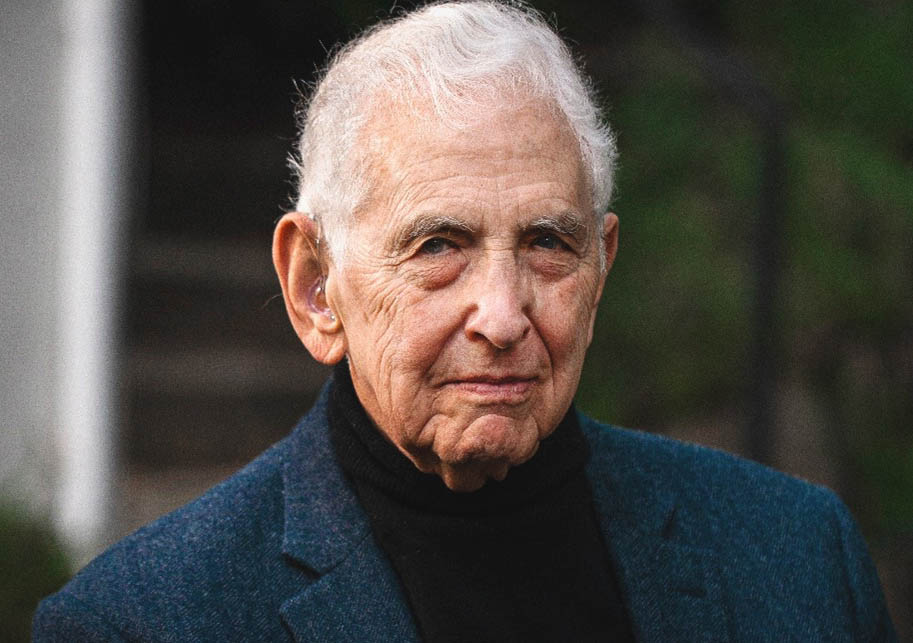WASHINGTON, (Reuters) – Daniel Ellsberg, the U.S. military analyst whose change of heart on the Vietnam War led him to leak the classified “Pentagon Papers,” revealing U.S. government deception about the war and setting off a major freedom-of-the-press battle, died on Friday at the age of 92, his family said in a statement.
Ellsberg, who had been diagnosed with inoperable pancreatic cancer in February, died at his home in Kensington, California, the family said.
Long before Edward Snowden and Wikileaks were revealing government secrets in the name of transparency, Ellsberg let Americans know that their government was capable of misleading and even lying to them. In his later years Ellsberg would become an advocate for whistleblowers and leakers and his “Pentagon Papers” leak was portrayed in the 2017 movie “The Post.”
Ellsberg secretly went to the media in 1971 in hopes of expediting the end of the Vietnam War. It made him the target of a smear campaign by the Nixon White House. Henry Kissinger, who was then the president’s national security adviser, referred to him as “the most dangerous man in America who must be stopped at all costs.”
When he went to Saigon for the State Department in the mid-1960s, Ellsberg had an impressive resume. He had earned three degrees from Harvard, served in the Marine Corps and worked at the Pentagon and the RAND Corporation, the influential policy research think tank.
He was a dedicated Cold War warrior and hawk on Vietnam at the time. But Ellsberg, in his 2003 book, “Secrets: A Memoir of Vietnam and the Pentagon Papers,” said he was only one week into a two-year tour of duty in Saigon when he realized the United States was in a war it would not win.
Meanwhile at the behest of Defense Secretary Robert McNamara, Pentagon officials had secretly been putting together a 7,000-page report covering U.S. involvement in Vietnam from 1945 through 1967. When it was finished in 1969, two of the 15 published copies went to the RAND Corporation, where Ellsberg was once again working.
With his new perspective on the war, Ellsberg started attending peace rallies. He said he was inspired to copy the “Pentagon Papers” after hearing an anti-war protester say he was looking forward to going to prison for resisting the draft.
Ellsberg began sneaking the top-secret study out of the RAND office and copying it at night on a rented Xerox machine – using his 13-year-old son and 10-year-old daughter as helpers. He took the documents with him when he moved to Boston for a job at the Massachusetts Institute of Technology and ended up sitting on them for a year and a half before passing pages to the New York Times.
The Times ran its first installment of the “Pentagon Papers” on June 13, 1971, and the administration of President Richard Nixon moved quickly to get a judge to stop further publication. Nixon’s claim of executive authority and invocation of the Espionage Act set off a freedom-of-the-press fight over the extreme censorship of prior restraint.
Ellsberg’s next move was to give the “Pentagon Papers” to the Washington Post and more than a dozen other newspapers. In New York Times v. U.S., the Supreme Court ruled less than three weeks after first publication that the press had the right to publish the papers, and the Times resumed doing so.
The study said the U.S. officials had concluded that the war probably could not be won and that President John F. Kennedy approved of plans for a coup to overthrow the South Vietnamese leader. It also said Kennedy’s successor, Lyndon Johnson, had plans to expand the war, including bombing in North Vietnam, despite saying during the 1964 campaign that he would not. The papers also revealed the secret U.S. bombing in Cambodia and Laos and that casualty figures were higher than reported.
The Times never said who leaked the papers but the FBI quickly figured it out. Ellsberg remained underground for about two weeks before surrendering in Boston.
“I felt that as an American citizen, as a responsible citizen, I could no longer cooperate in concealing this information from the American public,” Ellsberg said at the time. “I did this clearly at my own jeopardy and I am prepared to answer to all the consequences of this decision.”
He would say that he regretted not leaking the papers sooner.




